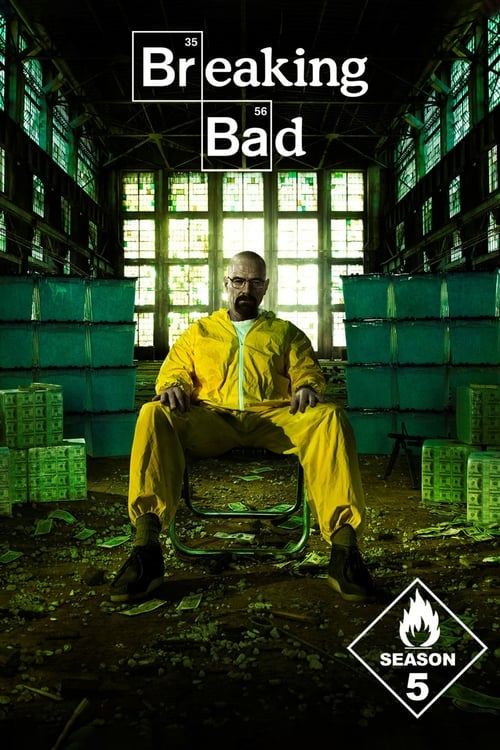
Ask Your Own Question
What is the plot?
The fifth season of Breaking Bad begins with the aftermath of the events in the fourth season finale. Walter White, now fully embracing his identity as Heisenberg, is seen in a flash-forward, where he is purchasing a car and retrieving a hidden M60 machine gun from a storage locker. The scene then shifts back to the present, where Walter, Jesse Pinkman, and Mike Ehrmantraut are dealing with the fallout from Gus Fring's death. They are now in control of the meth operation but face challenges in maintaining their business.
Walter, Jesse, and Mike meet to discuss their next steps. Mike is concerned about the safety of their operation and the need to eliminate any loose ends, particularly the nine men who worked for Gus. Walter, however, is more focused on expanding their operation and increasing production. Tensions rise as Mike and Walter clash over their differing priorities. Walter's ambition begins to overshadow his caution, leading to a rift between him and Mike.
In a pivotal moment, Walter decides to take matters into his own hands. He orchestrates the murder of the nine men, using a methodical approach to ensure that there are no witnesses. This act solidifies his transformation into a ruthless drug lord. Meanwhile, Jesse struggles with the moral implications of their actions, feeling increasingly uncomfortable with the violence and the direction their lives are taking.
As the season progresses, Walter's relationship with his family becomes strained. Skyler White, his wife, is aware of his criminal activities and is deeply conflicted. She becomes involved in laundering the drug money through the car wash they purchased, but her emotional turmoil is evident. Walter's manipulation and lies create a growing chasm between them, as Skyler grapples with the reality of her husband's choices.
Walter's ego continues to grow, leading him to make reckless decisions. He confronts Mike about his control over the operation, insisting that he should have a larger role. This confrontation escalates, resulting in a violent showdown where Walter ultimately kills Mike, further cementing his descent into darkness. Jesse is left to deal with the aftermath, feeling increasingly isolated and disillusioned with Walter's transformation.
The introduction of new characters, such as Todd Alquist, adds complexity to the narrative. Todd becomes an integral part of the operation, displaying a disturbing willingness to engage in violence. His actions, including the cold-blooded murder of a young boy who witnesses a train heist, highlight the moral decay surrounding Walter and Jesse. Walter's decision to involve Todd in their operation reflects his growing disregard for human life.
As the season nears its climax, Walter's actions begin to catch up with him. Hank Schrader, Walter's brother-in-law and a DEA agent, starts to connect the dots between Heisenberg and Walter. The tension builds as Hank discovers a book of Walt Whitman poetry in Walter's bathroom, which leads him to suspect that Walter is the elusive drug kingpin he has been hunting. This revelation sets the stage for a dramatic confrontation.
In a series of intense episodes, Hank confronts Walter about his double life. The confrontation is fraught with emotion, as Walter tries to maintain his facade while Hank grapples with the betrayal of his family member. The stakes escalate when Walter's actions lead to a violent confrontation with Hank and his partner, Steven Gomez, resulting in Gomez's death and Hank's eventual demise at the hands of Jack Welker and his gang.
The final episodes of the season depict Walter's complete transformation into a villain. He becomes increasingly paranoid and desperate, leading to a series of calculated moves to protect himself and his empire. He orchestrates the murder of his former associates and manipulates Jesse into a position of vulnerability. The emotional toll on Jesse is profound, as he is forced to confront the reality of Walter's betrayal and the destruction of their partnership.
In the series finale, Walter returns to Albuquerque to tie up loose ends. He confronts the consequences of his actions, leading to a final showdown with Jack and his gang. The climax is intense, with Walter using the M60 to take out the gang members in a dramatic and violent confrontation. In the end, Walter faces his own mortality, succumbing to his injuries while ensuring that Jesse escapes, leaving behind a legacy of destruction and chaos.
The season concludes with a haunting image of Walter in the meth lab, surrounded by the remnants of his empire, a stark reminder of the choices he made and the lives he destroyed in his quest for power and control.
What is the ending?
In the ending of Breaking Bad, Walter White confronts his enemies, rescues Jesse Pinkman, and ultimately meets his demise in a final act of defiance. The series concludes with Walter succumbing to his injuries in a meth lab, leaving behind a legacy of chaos and destruction.
As the final episode begins, Walter White, now a shadow of his former self, is on the run. He has been living in isolation, hiding from the law and the consequences of his actions. The opening scene shows him in a dilapidated car, driving through the snow-covered landscape, his face gaunt and weary. He arrives at a remote cabin where he retrieves a hidden stash of money, a remnant of his drug empire.
Walter's first significant action is to confront his former business partners, Elliott and Gretchen Schwartz. He threatens them into creating a trust fund for his children, ensuring they will be financially secure after his death. This scene highlights Walter's desperation to control his legacy, even as he faces the end of his life.
Next, Walter seeks out his former associate, Todd Alquist, who has taken Jesse Pinkman captive to cook meth for a white supremacist gang. Walter's plan is to rescue Jesse and eliminate the gang. He constructs a makeshift automatic gun rigged in the trunk of his car, showcasing his resourcefulness and determination.
The tension escalates as Walter arrives at the gang's compound. He uses the gun to take out several members of the gang in a dramatic and violent confrontation. The camera captures the chaos and brutality of the scene, emphasizing the consequences of Walter's choices. In the midst of the gunfire, Walter finds Jesse, who is visibly traumatized and broken, forced to cook meth against his will.
Walter and Jesse share a moment of connection, but it is fraught with tension. Walter offers Jesse the chance to kill him, but Jesse refuses, telling Walter to do it himself if he wants to die. This moment encapsulates the complex relationship between the two men, filled with betrayal, manipulation, and a twisted sense of loyalty.
As the dust settles, Walter is left alone in the meth lab, surrounded by the equipment that symbolizes his empire. He is wounded from the gunfight, and the weight of his actions begins to take its toll. The camera lingers on Walter as he walks through the lab, touching the machinery with a mix of nostalgia and regret. He collapses to the ground, succumbing to his injuries.
In the final moments, the camera pulls back, revealing Walter's lifeless body lying on the floor of the lab, the blue meth crystals scattered around him. The scene is haunting, a visual representation of the destruction he has wrought on himself and those around him. The series ends with a sense of finality, leaving viewers to reflect on the journey of Walter White and the impact of his choices.
In terms of character fates, Walter White dies alone in the meth lab, a tragic end to his transformation from a mild-mannered teacher to a ruthless drug lord. Jesse Pinkman, although physically free, is left emotionally scarred and traumatized by his experiences. He drives away from the compound, screaming in anguish, symbolizing his escape from the chaos but also the deep psychological scars that will remain with him. The other characters, including the gang members and Walter's family, are left to deal with the aftermath of Walter's actions, highlighting the far-reaching consequences of his descent into the criminal underworld.
Is there a post-credit scene?
In "Breaking Bad" Season 5, there is no post-credit scene following the final episode, "Felina." The series concludes with a powerful and emotional ending that wraps up the story of Walter White. The final moments show Walter entering the meth lab, where he takes in the equipment and reflects on his journey. The camera captures his complex emotions--regret, pride, and a sense of closure--as he moves through the space that defined much of his life. The series ends with Walter collapsing on the floor, the sound of sirens approaching, leaving viewers with a poignant sense of finality without any additional scenes or credits.
What happens to Walter White's family in Season 5?
In Season 5, Walter White's family experiences significant turmoil as his criminal activities escalate. Skyler, his wife, becomes increasingly aware of Walter's double life and struggles with the moral implications of his actions. She is drawn into the drug trade when she helps launder his money through the car wash they purchase. Their relationship becomes strained, leading to moments of tension and fear, especially when Walter's actions put their children at risk. Walter Jr. remains largely unaware of the full extent of his father's criminality, but he senses the growing distance between his parents.
How does Hank Schrader's investigation impact the story in Season 5?
Hank Schrader's investigation into the drug trade intensifies in Season 5, particularly as he begins to suspect that 'Heisenberg' is Walter White. His discovery of Walt Whitman's book in the bathroom, which contains a crucial clue, marks a turning point in the narrative. Hank's relentless pursuit of the truth leads to a dramatic confrontation with Walter, revealing the deep personal conflict between the two characters. Hank's determination to bring Walt to justice creates a palpable tension throughout the season, culminating in tragic consequences.
What role does Gus Fring's death play in Season 5?
Gus Fring's death at the end of Season 4 sets the stage for Season 5, as it creates a power vacuum in the drug trade. Walter White, now more ruthless and ambitious, takes over Gus's operation with the help of Mike Ehrmantraut and Jesse Pinkman. This shift in power dynamics leads to increased violence and moral decay, as Walter becomes more deeply entrenched in the criminal world. The absence of Gus also allows for the emergence of new threats, including the rise of the neo-Nazi gang, which ultimately complicates Walter's plans and leads to dire consequences.
How does Jesse Pinkman's character evolve in Season 5?
In Season 5, Jesse Pinkman undergoes significant character development as he grapples with the consequences of his actions and the moral implications of his involvement in the drug trade. Initially, he is excited about the power and wealth that come with their operation, but as the season progresses, he becomes increasingly disillusioned. The death of Jane and the impact of Walter's manipulations weigh heavily on him, leading to moments of guilt and despair. Jesse's relationship with Walter becomes more strained, as he begins to see Walter's true nature, culminating in a heartbreaking betrayal.
What is the significance of the final confrontation between Walter White and Jesse Pinkman?
The final confrontation between Walter White and Jesse Pinkman in Season 5 is a pivotal moment that encapsulates their tumultuous relationship. It occurs in the series finale, where Jesse confronts Walter about the pain and destruction he has caused. This scene is charged with emotion, as Jesse, who has been manipulated and used by Walter throughout the series, finally stands up for himself. Walter's desperate attempts to justify his actions reveal his moral decay, while Jesse's refusal to forgive him signifies a break from their toxic bond. This confrontation serves as a culmination of their complex dynamic, highlighting themes of betrayal, guilt, and the loss of innocence.
Is this family friendly?
"Breaking Bad" Season 5 is not family-friendly and contains several potentially objectionable or upsetting scenes and aspects that may be distressing for children or sensitive viewers. Here are some key elements:
-
Violence: The season features graphic violence, including shootings, beatings, and intense confrontations that can be quite brutal and disturbing.
-
Drug Use: The show revolves around the illegal drug trade, showcasing drug manufacturing and use, which may not be suitable for younger audiences.
-
Moral Ambiguity: Characters engage in morally questionable behavior, including manipulation, betrayal, and murder, which can be unsettling.
-
Death and Loss: There are significant themes of death, including the impact of violence on families and communities, which can be emotionally heavy.
-
Strong Language: The dialogue includes frequent use of profanity and harsh language, which may not be appropriate for children.
-
Emotional Turmoil: Characters experience intense emotional struggles, including fear, guilt, and despair, which can be quite heavy and may resonate deeply with sensitive viewers.
-
Sexual Content: There are scenes that involve sexual situations and suggestive themes that may not be suitable for younger audiences.
Overall, the series delves into dark themes and complex character arcs that are intended for a mature audience.



















